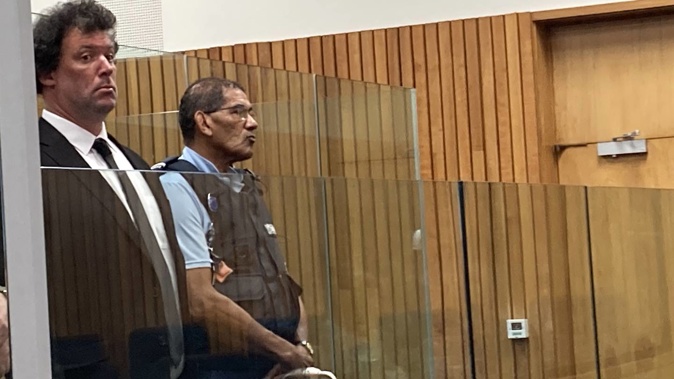

WARNING: This story contains deals with allegations of sexual harm and may be upsetting.
A jury has begun its deliberations to decide whether tattoo artist Shaky Pete used female clients for his own sexual needs or was the victim of a hate campaign on social media.
Peter John Roberts pleaded not guilty to a charge of sexual violation by unlawful sexual connection and six of indecent assault when his trial began in the New Plymouth District Court last week.
The offending relates to two women, who Roberts is alleged to have repeatedly groped, fondled their bottoms and touched their genitals while tattooing them between January and the end of July 2020 in New Plymouth.
The Crown says Roberts’ actions were deliberate and he wanted sex with the victims but defence lawyer Patrick Mooney argued the women had tailored their complaints after reading online allegations and rumours about him.
Crown solicitor Cherie Clarke, in her closing address to the jury on Wednesday, said Roberts was sexually interested in both victims, he asked one on a date and pestered the other for sex, and he used them for his own sexual purposes.
“He knew exactly where he was placing his hands and what he was doing.”
Clarke said Roberts had breached the trust of his clients, who were both young women and were in a vulnerable position on his tattoo table in a state of undress.
“The squeezing and massaging of their bottoms or butts is not part of a normal tattoo session,” Clarke said.
Touching a client’s genitals was also not part of a normal tattooing experience.
Clarke told the jury of five men and seven women that in the circumstances Roberts would have known what he was doing was wrong.
“He did it deliberately and he knew it was indecent.
”He had no reason to believe on reasonable grounds that they were consenting.”
Three women from the United Kingdom gave evidence during the trial about being allegedly sexually assaulted by Roberts years earlier in 2014, 2016 and 2018. His alleged behaviour there mirrored the testimony of the Taranaki women.
Clarke said there were striking similarities between the evidence of the three UK women and the two New Plymouth victims.
All five victims, who were getting their backs and buttock area tattooed, described Roberts repeatedly trying to squeeze their “bums” despite their protests to get him to stop and batting his hand away.
/cloudfront-ap-southeast-2.images.arcpublishing.com/nzme/2WH52ZOQVNARTJEMYJ7QYD6IUM.jpg)
A jury has retired to consider whether tattoo artist Peter Roberts sexually abused two female clients or whether he was the victim of an online smear campaign. Photo / File
Roberts told two of the women it was okay to touch their genitals because he was wearing gloves, spoke about wanting to have sex with them, threatened the tattoo would hurt more if they didn’t, and expressed a desire to “bury his face in (their) butts”.
The UK police had not handled the complaints made against Roberts as seriously or carried out a thorough investigation like New Zealand officers had, Clarke said.
Roberts had been caught out lying to police about sending sexual messages to one of the woman and regarding photos of the other.
“On all important issues, what he has said is not true nor is it possibly true.”
Clarke explained an unwanted kiss, if done deliberately, was an indecent assault in law.
Roberts’ behaviour, however, went further than an “unwanted kiss” and he knew the women didn’t consent.
“They told you, that they didn’t want him to do it,” Clarke told the jury.
Contact between the victims on social media provided them comfort and made them feel less alone after they had been sexually assaulted, it did not influence what they told police, she said.
Defence lawyer Patrick Mooney said a trial was determined by evidence and proven facts not by rumour or views expressed elsewhere or on social media using second-hand information.
Mooney said the victims had been influenced by what they had seen on social media and pointed to where one of the victims agreed she had made an assumption about what Roberts was trying to do when she spoke to police after reading things online.
It was a classic example of how social media had impacted on the statements they gave police and influenced their thoughts, he said.
“It did influence the detail and she acknowledged that.”
Mooney said the women’s accounts of what happened were loaded with inconsistencies.
He said the Brutal Ink studio where the teenager claimed Roberts had sexually assaulted her had CCTV cameras, with sound, that were monitored by the owner who was aware of the allegations being made about him.
“She did not see or hear anything that raised any alarm bells for her.”
Mooney said there were plenty of opportunities for the teen to say no and her memory was not reliable.
“The whole problem is whether or not you can rely on her evidence being accurate.”
The victim became part of the online crusade against Roberts.
Mooney warned the jury to be very careful how they used the evidence given by the women from the UK as Roberts was not on trial about their allegations.
There was limited opportunity to question what they had said to others at the time of the offending and Mooney pointed out one of the alleged victims had only come forward seven years later.
He said there were problems with the details the women provided to police due to the delays in them coming forward and their exposure to social media.
“There are people who are actually not directly involved who build up this snowball.”
Mooney questioned if there were others who Roberts had allegedly raped, where were they?
Sexual comments made by Roberts to the women, including in messages to the teenager, were just banter and should not be taken out of context, Mooney told the jury.
“Is it a sexual interest or is it just flirting?”
Mooney said Roberts had been open and honest with the owner of Brutal Ink, customers and police regarding the online allegations and harassment he was facing.
After Judge Gregory Hikaka summed up the case late on Wednesday afternoon the jury retired to deliberate its verdicts at 9.30am on Thursday.
- Leighton Keith, Open Justice
SEXUAL HARM
Where to get help: If it's an emergency and you feel that you or someone else is at risk, call 111. If you've ever experienced sexual assault or abuse and need to talk to someone, contact Safe to Talk confidentially, any time 24/7: • Call 0800 044 334 • Text 4334 • Email [email protected] • For more info or to web chat visit safetotalk.nz Alternatively contact your local police station - click here for a list. If you have been sexually assaulted, remember it's not your fault.

Take your Radio, Podcasts and Music with you









